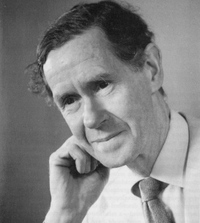J.L. Mackie
Born
in Australia
August 28, 1917
Died
December 12, 1981
Genre
Influences
John Anderson

|
Ethics: Inventing Right and Wrong
—
published
1977
—
6 editions
|
|

|
The Miracle of Theism: Arguments For and Against the Existence of God
—
published
1983
—
8 editions
|
|

|
Evil and Omnipotence
|
|

|
Problems from Locke
—
published
1976
—
5 editions
|
|

|
Hume's Moral Theory
—
published
1980
—
9 editions
|
|

|
The Cement of the Universe: A Study of Causation
—
published
1980
—
5 editions
|
|

|
Truth, Probability, and Paradox
—
published
1972
—
3 editions
|
|

|
Persons and Values: Selected Papers, Volume II
—
published
1985
—
2 editions
|
|

|
Causes and Conditions
—
published
1965
|
|

|
Logic and Knowledge: Selected Papers, Volume I
—
published
1985
—
2 editions
|
|
“the abandonment of a belief in objective values can cause, at least temporarily, a decay of subjective concern and sense of purpose. That it does so is evidence that the people in whom this reaction occurs have been tending to objectify their concerns and purposes, have been giving them a fictitious external authority. A claim to objectivity has been so strongly associated with their subjective concerns and purposes that the collapse of the former seems to undermine the latter as well.”
― Ethics: Inventing Right and Wrong
― Ethics: Inventing Right and Wrong
“The traditional arguments for the existence of God have been fairly thoroughly criticised by philosophers. But the theologian can, if he wishes, accept this criticism. He can admit that no rational proof of God's existence is possible. And he can still retain all that is essential to his position, by holding that God's existence is known in some other, non-rational way. I think, however, that a more telling criticism can be made by way of the traditional problem of evil. Here it can be shown, not that religious beliefs lack rational support, but that they are positively irrational, that the several parts of the essential theological doctrine are inconsistent with one another, so that the theologian can maintain his position as a whole only by a much more extreme rejection of reason than in the former case. He must now be prepared to believe, not merely what cannot be proved, but what can be disproved from other beliefs that he also holds.”
―
―
“The facts have to be determined by empirical evidence, and our thinking has then to conform to the facts, not the facts to our thinking”
― Ethics: Inventing Right and Wrong
― Ethics: Inventing Right and Wrong
Topics Mentioning This Author
| topics | posts | views | last activity | |
|---|---|---|---|---|
| The History Book ...: * ROLE OF RELIGION IN HISTORY | 119 | 684 | Nov 15, 2025 02:24PM |





























